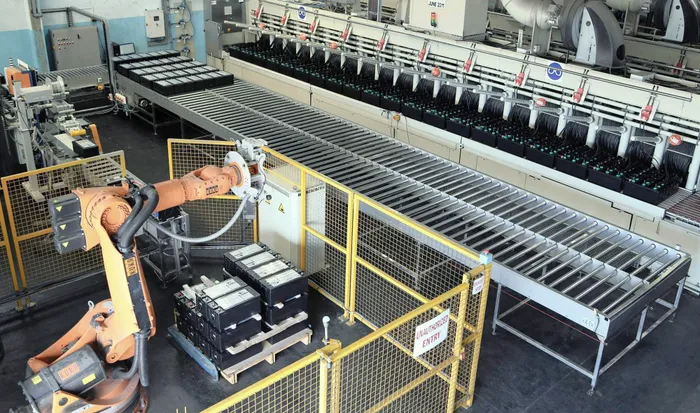Metair stabilises production and navigates tough automotive markets locally and abroad

First National Battery production line. Metair expects the subsidiary to be affected by lower demand from original equipment manufacturers in the six months to June 30. Photo: Simphiwe Mbokazi/Independent Newspapers
Metair Investments, the automotive component and battery group made good progress on its stabilisation and turnaround strategy in the six months to June 30, despite volume decreases and high debt, the group said yesterday.
Major new projects undertaken in 2023 had been stabilised with subsidiary Hesto Harnesses demonstrating a strong operational recovery. Ongoing profitability improvement initiatives were expected to improve future earnings and support reduced debt gearing, the group said in an operational update yesterday.
“The ability to remain agile in the markets in which we operate in as well as to mitigate negative impacts of lower South African Original Equipment Manufacturers' (OEMs) customer demand and volume variability, was successfully navigated,” the group’s directors said.
During the period borrowing costs increased significantly due to higher debt used to support customer expansion, higher working capital investments and the extreme interest rates in Türkiye. Türkiye's interest rates increased to 50% and inflation peaked at 71.60% through the period.
The group formulated a debt restructuring plan, including subsidiary Hesto Harnesses's obligations, that was approved by the board. The debt-to-equity ratio remained elevated due to increased working capital, start-up funding for new projects and the impact of hyperinflation on Mutlu Akü.
The group however, was still operating within agreed bank covenant levels. The debt restructure programme was anticipated to launch in the fourth quarter of the 2024 financial year.
Market challenges included high interest and inflation rates, as well as continued supply chain and port disruptions.
At Hesto, which had reported significant losses in the first half, recovery, stability and operational profitability improved.
In Türkiye, the operating performance of battery manufacturing subsidiary Mutlu Akü continued to improve, following production disruptions in the second half of the 2023 financial year.
A Mutlu Akü, a de-risking option was being negotiated to pay down South African debt and reduce the interest cost burden.
From a volume perspective, auto battery units sold in the Energy Storage business improved by 10%, up 358 000 units to 3.9 million units, supported by stronger aftermarket and export sale volumes.
A temporary drop in demand from a major local automotive components' customer impacted the overall South African OEM vehicle production, as volumes were 8% softer.
Normal production at the customer however was expected to resume early in the fourth quarter of the 2024 financial year.
In the automotive components vertical, the core automotive subsidiaries: lighting (Lumotech), suspension (Supreme Springs) and H-VAC (Smiths Manufacturing), effectively managed the impact of temporary lower demand.
At Hesto, Ford volumes progressed in line with expectations and close collaboration between Hesto's customer and technology partner was expected to support revenue and operating profit over the remaining revised business case model life of 8 years.
Mutlu Akü continued to recover from the challenges of the 2023 financial year, including the shortage of contract workers and the loss of material export volumes. Automotive sales volumes increased to 1.8 million batteries from 1.76m in the same period in 2023.
At Rombat SA in Romania, automotive volumes improved 41% to 1.3m batteries supported by market gains in exports and aftermarket sales. Automotive sales volumes for First Battery (FB) in South Africa were expected to be 9% softer, due to reduced demand from local OEMs and a price sensitive local retail environment.
Post June 30, 2024, the group raised the rand equivalent of $38.2m in the form of a bridge loan as a first step to rebalance the shareholder loan funding in Hesto, and consequently advanced R685m as a subordinated loan to Hesto.
BUSINESS REPORT
Related Topics: